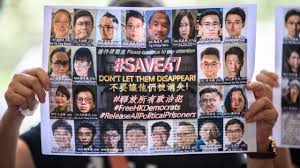In the city’s largest national security trial, a Hong Kong court on Tuesday, sentenced 45 pro-democracy activists under its national security laws, with former law professor, “mastermind” Benny Tai receiving the longest term of 10 years.
The defendants were charged with subversion for holding an unauthorised primary election in 2020 aimed at selecting pro-democracy candidates.
International condemnation was swift, with Western countries and rights groups slamming the sentencing as evidence of the erosion of political freedoms in the city since Beijing imposed a security law in 2020.
Tai’s sentence was the longest yet handed out under the security law, which was brought in to quash dissent after massive, sometimes violent pro-democracy protests in 2019.
His 44 co-defendants were sentenced to shorter terms beginning from four years and two months.
All were charged with subversion after holding an informal poll in 2020 as part of a strategy to win a pro-democracy electoral majority.
The group includes some of the most prominent figures of Hong Kong’s once-diverse political opposition.
After Tai, the second-longest sentence of seven years and nine months was handed to young activist Owen Chow.
In a Facebook post before the sentencing, Chow had said he was “absolutely not optimistic”.
“But I see hope because even (if) I am far from the day of release, we have now seen the end point,” he wrote.
‘Gravely concerned’
On Tuesday, the 45 were crammed into the defendant’s dock, from where they occasionally waved to the public.
Many have already spent more than 1,300 days in jail.
Pro-democracy politicians Au Nok-hin, Andrew Chiu and Ben Chung were singled out as organizers, but received lesser sentences after testifying against Tai.
“Long Hair” Leung Kwok-hung, the 68-year-old co-founder of the city’s last standing opposition party, received a term of six years and nine months.
His wife and party leader Chan Po-ying told AFP that the term was “within our expectations”.
“It is what it is – no matter (whether) I laugh or I cry, so I choose to laugh a bit,” she said.
After the sentencing, the mother of defendant Hendrick Lui silently took out a placard reading “The righteous shall live, the wicked shall perish”.
She was taken away in a police van within seconds, according to video footage from Hong Kong media.
‘Refused to be tamed’
Leticia Wong, a former district councillor, told AFP that she found the terms were “encouraging people to plead guilty and testify against their peers”.
“For those who refused to be tamed, punishment is obviously heavier,” Wong said.
Western countries and international rights groups have condemned the trial as evidence of Hong Kong’s increased authoritarianism.
Australia’s government said it was “gravely concerned” after dual citizen Gordon Ng received a sentence of seven years and three months, and said it would continue to advocate for his “best interests”.
A spokesperson for the US consulate in Hong Kong said the United States “strongly condemns” the sentencing.
China on Tuesday said such Western criticism “seriously desecrates and tramples on the spirit of the rule of law”, and warned against interference.
Taiwan’s presidential office said “democracy is not a crime” and condemned the “use of judicial measures and unfair procedures” to curtail political participation and freedom of speech.
The sentences show “how fast Hong Kong’s civil liberties and judicial independence have nosedived”, international NGO Human Rights Watch said.
Another closely watched national security trial will see a key development on Wednesday when jailed pro-democracy media tycoon Jimmy Lai testifies in his collusion trial.
China and Hong Kong have repeatedly pushed back against criticisms, saying the security law restored order following the 2019 protests.
Hong Kong’s security minister Chris Tang said Tuesday’s sentences “reflected the severity of the crime”, but added the government would study the ruling on individual sentences and decide whether to appeal them.
‘Constitutional crisis’
Forty-seven people were initially charged after they were arrested in January 2021.
Thirty-one pleaded guilty, and 16 stood a 118-day trial last year, with 14 convicted and two acquitted in May.
The aim of the election primary, which took place in July 2020, was to pick a cross-party shortlist of pro-democracy candidates to increase their electoral prospects.
If a majority was achieved, the plan was to force the government to meet the 2019 protesters’ demands – including universal suffrage – by threatening to indiscriminately veto the budget.
Three senior judges handpicked by the government to try security cases said the group would have caused a “constitutional crisis”.
The subversion charge could have carried a sentence of up to life in prison.


